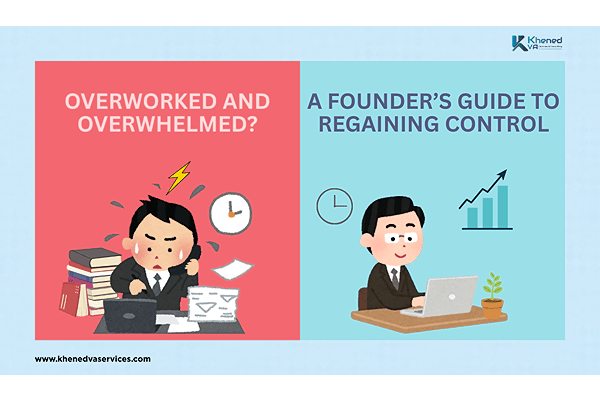If you’re a founder, you’ve probably felt it—that creeping, heavy weight of being buried under too much work.
One moment, you’re handling meetings, decisions, messages, and client demands like a pro. The next, you’re staring blankly at your to-do list, wondering where to start—or if you even can.
Overwhelm isn’t just common for founders—it’s practically a rite of passage. But it doesn’t have to be your permanent state. The more you stay stuck in reactive mode, the less you’re truly leading and the more you’re simply surviving. And survival mode isn’t sustainable—for you or your business.
The good news? There’s a way out. Here’s how to reset, reclaim your focus, and create breathing room when you’re drowning in work.
1. Stop Pushing—Pause Instead
When things feel out of control, it’s tempting to work longer hours, skip breaks, and grind harder. But that only digs you deeper into exhaustion.
The most productive thing you can do when overwhelmed? Stop.
Take at least two consecutive days off. Block your calendar. Mute the notifications. Let your mind reset.
Why this matters:
This isn’t ignoring urgent tasks—it’s breaking the cycle that’s keeping you stuck.
2. Offload Anything You Can
Founders often believe they have to do it all to ensure it’s done right. In reality, that belief is a fast track to burnout.
Ask yourself:
Delegate to a team member, hire a VA, or outsource where possible. Your role isn’t to be the busiest person in the room—it’s to make sure the right work is being done by the right people.
If outsourcing isn’t an option, focus on the next strategy.
3. Cut Low-Value Tasks Completely
Not every task on your list is worth doing. Many are just habits, outdated processes, or “zombie tasks” that serve no real purpose anymore.
For each task, ask:
If you cut something truly important, you can always bring it back—but most of the time, you won’t miss it.
4. Trade Perfection for Progress
Perfectionism might look like high standards, but when you’re overloaded, it slows you down and adds unnecessary stress.
Instead, aim for “good enough.”
That might mean:
Perfection is subjective—and often overrated. Focus on outcomes, not flawless execution.
Automation tools (Zapier, Notion, built-in CRM features) can also help you simplify and speed up routine work.
5. Create Boundaries Around Your Time
If you’re always available, you’ll always be interrupted—and you’ll never have the focus you need.
Strong founders protect their attention by:
Boundaries aren’t about being unavailable—they’re about being strategically available so you can focus where you matter most.
The Bottom Line
Feeling overloaded isn’t a sign you’re failing—it’s a signal that something in your approach needs to change.
The most successful founders aren’t the ones who never get overwhelmed—they’re the ones who spot it early, reset, and come back with clarity.
By pausing, delegating, cutting dead weight, aiming for progress over perfection, and protecting your time, you’ll shift from reactive mode to intentional leadership.



